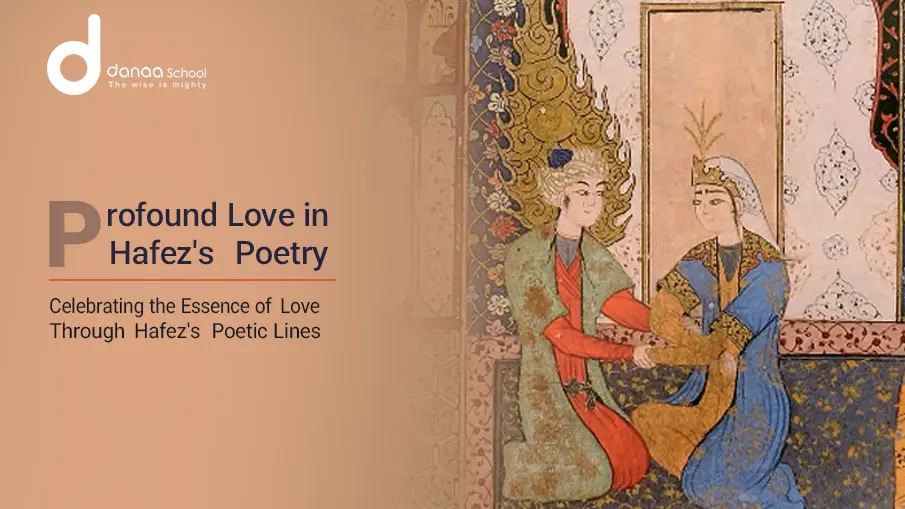Hafiz, a lyric poet who dwelled in the lush landscapes of Persia during the 14th century, remains one of the most cherished Sufi masters of all time. Known for his deep spiritual insights and the lyrical beauty of his work, Hafiz’s poems, particularly those about love, resonate deeply with a broad audience, offering a mystical and earthly perspective on emotion.
This article will explore Hafiz love poetry’s intricate beauty and complexity, exploring how it continues to touch hearts and inspire minds worldwide.
Understanding Hafiz’s Influence
In Persian literature, Hafiz is not merely a poet but a beacon of philosophical and spiritual thought. His works are often compared with those of other Sufi poets like Rumi, yet Hafiz’s poetic voice is distinctly nuanced and richly personal. This section explores his unique place in the pantheon of great literary figures, discussing how his approach to poetry makes him a timeless figure in world literature.
Themes in Hafiz Love Poetry
Hafiz’s poems about love are intricate tapestries of emotion, woven with words that speak on multiple levels. From the euphoria of divine love to the agony of unrequited love, Hafiz captures a wide spectrum of human emotions. Here, we will analyze some of his most profound poems to better understand these themes, exploring how he articulates the complex nature of love and its various manifestations.
Hafiz’s Poetic Style and Techniques
The enchantment of Hafiz’s poetry lies in his exceptional use of language and imagery. This part will explore the literary devices and Sufi symbols he employs, which create the vivid and transformative experiences for which his poems are known. His mastery in crafting metaphors and similes that resonate with his readers’ soulful experiences is a testament to his profound understanding of human nature and spirituality.
Hafiz’s Impact on Readers and Writers
Hafiz’s influence extends far beyond his own time and borders. Many poets and writers across the centuries have drawn inspiration from his works, and countless readers have found solace and joy in his verses. This section examines his impact through the centuries, discussing how his poetic legacy inspires new generations of poets and lovers of literature.
Cultural and Historical Context
Understanding Hafiz’s work’s cultural and historical context enriches our appreciation of his poems. This section discusses the era he wrote in, characterized by political upheavals and cultural blossoming, which significantly shaped his writing and the themes he explored. Persian societal norms and the mystical Sufi traditions of the time deeply influenced his perspectives on love and spirituality.
Learning from Hafiz’s Poetry
Hafiz does not merely entertain; he teaches. His verses reveal profound lessons on love, life, and spirituality. This section will discuss the timeless lessons embedded in his love poems and how they remain relevant to contemporary audiences, offering insights into how we might navigate our emotional landscapes with grace and wisdom.
Promoting Persian Poetry
Danaa School offers courses in Persian poetry, providing enthusiasts with a fantastic opportunity to discover poets like Hafiz. This final section includes a call to action for readers to engage more profoundly with Persian literary traditions through these courses, encouraging a deeper understanding and appreciation of this rich cultural heritage.
FAQs
What does Hafiz say about love?
Hafiz views love as the essential truth of the universe, often reflecting on its spiritual and transformative power. His poems articulate this theme through vivid imagery and profound philosophical insights.
What is the world's most famous love poem?
While subjective, many regard Hafiz’s “I Have Learned So Much” as among the most beautiful love poems ever written, celebrated for its deep sincerity and eloquent expression.
Are Rumi and Hafiz the same person?
No, Rumi and Hafiz were two different poets from Persia who wrote centuries apart, each with a unique style and philosophical outlook. While they explored similar themes of love and spirituality, their poetic expressions and techniques were distinctly their own.
Is it Hafiz or Hafez?
Both are correct, depending on the transliteration used from Persian to English. “Hafiz” is more commonly used in Western contexts, while “Hafez” is closer to the Persian pronunciation.
What is special about Hafiz?
Hafiz’s ability to weave profound spiritual insights into lyrical love poems sets him apart as one of the most influential Sufi poets ever. His work offers literary beauty and deep philosophical and emotional explorations, making it a rich source of inspiration and contemplation.
Conclusion
Hafiz’s poems about love transcend time and geography, continuing to inspire and captivate. His profound insights into love and life, expressed through his skilled poetic compositions, make him a treasure in world literature. His work enriches our understanding of Persian culture.
Explore the beautiful world of Persian poetry with Danaa School’s courses.
Learn about famous poets like Hafiz and explore their powerful words. Our Persian Poetry Courses are perfect for everyone, whether you’re just starting or already love poetry. Join us now and discover the magic of Persian poetry.










